Research resources
The Grant Lifecycle represents all activities typically involved in a research project; the cyclical process research can follow throughout it’s lifetime. The activities may be programmatic (scientific) or administrative in nature (or both).
The cycle can be as simple as finding, applying for and receiving a single research grant or building upon different phases of a multi-faceted research topic.
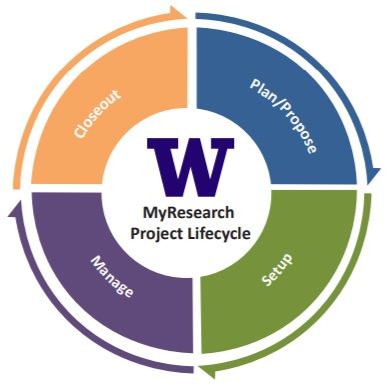
Quick links
Plan/Propose
The Plan/Propose stage begins with forming a hypothesis or research question. It includes identifying a sponsor (whether externally-funded or internally supported), and developing and submitting a proposal.
Find grant funding
Selecting a funding source involves finding a sponsor with goals that align with a given research project, or finding an opportunity for which a PI or team would be eligible to pursue.
Search through the list below to find opportunities for funding:
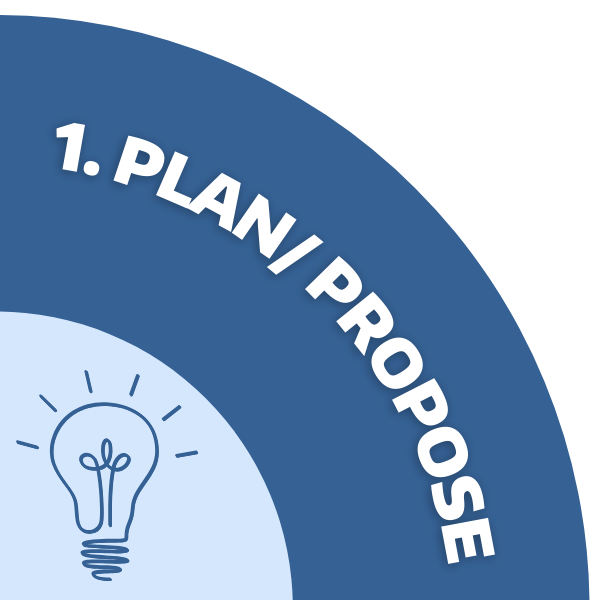
Internal UW Opportunities
External Opportunities
Preparing your proposal
This part of the lifecycle takes you through the steps needed to submit your research proposal.
Write your proposal
- Writing Successful Grants: View Proposal Development Page
- Develop your Broader Impact Legacy
- Funding Early Careers/Prep for NSF CAREER Award
- NSF Proposal Review Video
- Write Proposal (UW Seattle Resource)
- Develop Hypothesis/Question (UW Seattle Resource)
- Conduct Literature Search (UW Seattle Resource)
- Sponsor Requirements (UW Seattle Resource)
- Recruit Team (UW Seattle Resource)
- Facilities and Resources (UW Seattle Resource)
Budget development
When creating a budget for any proposal, start with the proposed work. Without a solid understanding of the work that needs to be accomplished, the budget is nearly impossible to develop. It’s important that the money matches the work. This page helps Bothell investigators plan their budget including: budget tools and resources, personnel, fringe benefit rates, supplies, travel, equipment, subcontracts, tuition, facilities and administrative costs, and more. Learn more about budget development here.
Proposal components
The proposal components page contains details on various data management tools, export control, and guidance on working with animals, human subjects,
and minors. Visit the Proposal components page.
Research policies
The research policies page contains information on deadlines, conflicts of interest, research center authorization/reauthorization processes, and staff and faculty effort. Visit the Research policies page.
Submit Your proposal
Finished grant work and the eGC1s are due to OSP (3 business days before grant deadline, usually at 5pm). PI’s have to complete their FIDS electronically (Financial Information Disclosure System), then the proposal/eGC1 is ready to be approved by leadership/supervisors and sent to OSP to route. View information on how to submit a proposal (UW Seattle Resource).
Required Grants Management for Investigators Training
Formerly known as Faculty Grants Management Training, this training provides an overview of the grants management process, from preparation of proposals to fiscal report preparation through final audit. Classes are provided by a live virtual training, and then an online refresher should be completed every four years. Training is required at the time of the PI’s first proposal in SAGE. Learn about the Required Grants Management training.
Setup
The Setup stage begins with receiving an award (congratulations!) or, if not externally funded, securing internal approval and resources.
It involves preparing the project for launch, including confirming that all compliance requirements are met, and making final arrangements for resources and facilities, and for collaborations.
Kick-off meeting
Once awarded, the Office of Sponsored Research will contact you to hold a kick-off meeting.
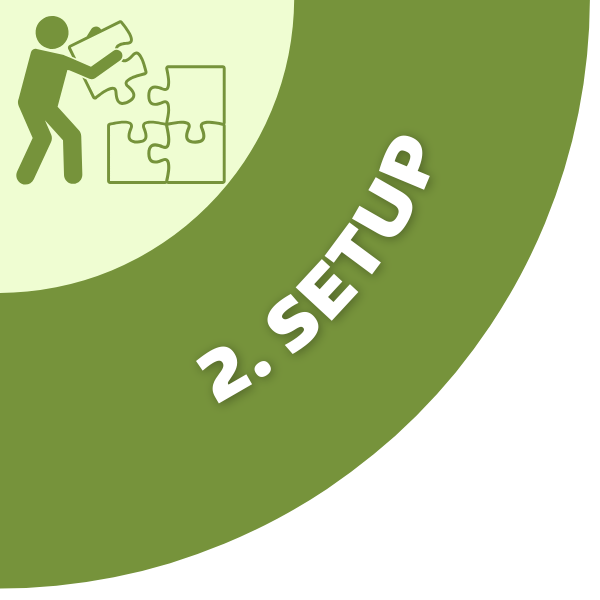
Other setup resources (UW Seattle resources)
- Sponsor requirements: Federal, non-federal, internal sponsors, industry clinical trials, agreement considerations.
- Compliance requirements (non-financial): Human subjects, animal use, export control, financial conflict of interest, Environmental health and safety, information privacy and security, classified research, faculty effort certification, audit.
- Collaborations: Agreement types, sharing information and data, sharing material, consultants, and subawards.
- Facilities and resources
- Financials
- Subawards
- Records and documentation
- Methods
- Data Collection
Manage
The Manage stage begins when all initial compliance requirements have been met and all scientific/programmatic preparations have been made. It comprises the entire time the research project is being conducted and includes all scientific activities as well as the supporting administration. It ends when data have been collected and analyzed and the project period has ended.
Fiscal management
Now that you have won an award, how do you budget, manage, and spend the funds?
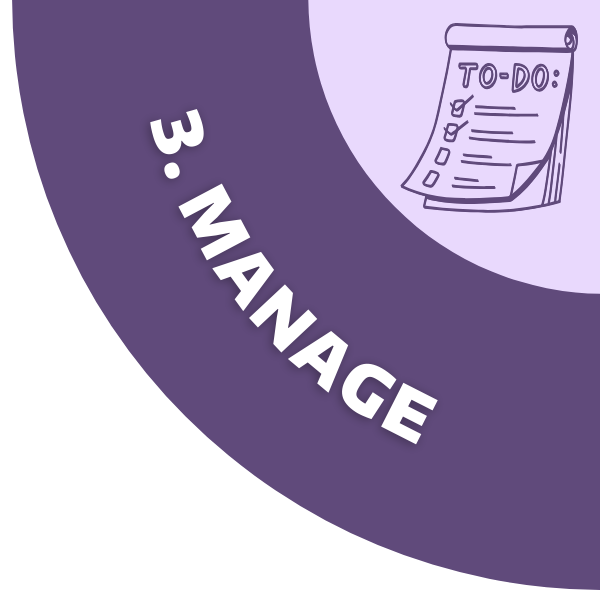
- View Award fiscal management page.
- GCCRs are submitted quarterly on staff effort (contact Leena Perera).
- Post-award fiscal compliance (contact Leena Perera).
Other management components (UW Seattle resources)
- Compliance requirements (non-financial): Human subjects, animal use, export control, financial conflict of interest, Environmental health and safety, information privacy and security, classified research, faculty effort certification, audit
- Award changes: Budget extension process, early termination and relinquishment
- Facilities and resources
- Collect data
- Analyze data
- Subawards
- Reporting
Recruit undergraduate researchers
- Edit or add a project to Connected Huskies Opportunities Database
- Visit Undergraduate research website
Closeout
The Closeout stage begins when a funded project period ends or when all data have been collected and analyzed. It includes all programmatic and administrative activities related to completing the project.
Steps to closing out a project:
- Budget closeout: making sure all expenses are appropriate
- Report to sponsor: detailed report of the research
- Report to campus: publicizing research through forums, faculty meetings, etc.
- Lessons learned: not every project runs smoothly so look for process improvements for the next project
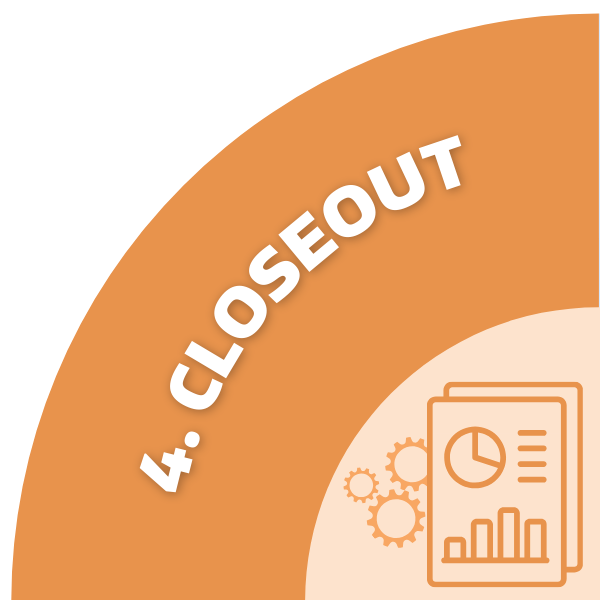
Even when a project is concluded, the process will continue through either extension grants to continue research or projects, as well as to create visibility on and off campus about the research that was done and the impact it is having.
MyResearch portal
MyResearch is a tool designed to assist you in monitoring your research administration activities. MyResearch provides a personalized view of various research-related activities including the status of Funding Actions, eGC1s, and Non-Award Agreements (NAAs), as well as research-required training transcripts.
More resources from UW Seattle
Questions?
Contact us to learn how we can support your work or schedule an appointment with one of our team members.
